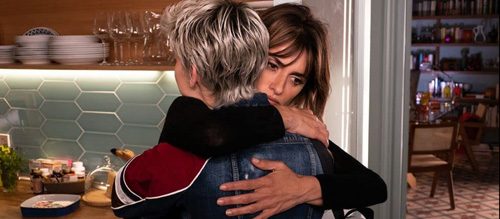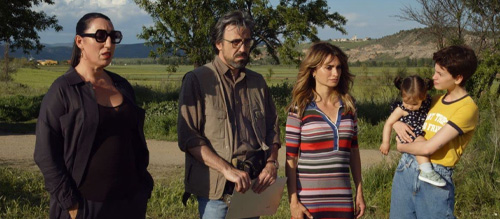Parallel Mothers (2021) Review

Parallel Mothers / Madres paralelas (2021)
Director: Pedro Almodóvar
Screenwriter: Pedro Almodóvar
Starring: Penélope Cruz, Milena Smit, Israel Elejalde, Aitana Sánchez-Gijón, Julieta Serrano, Rossy de Palma
While doing the festival circuit in 2021, Spanish auteur Pedro Almodóvar’s latest film Parallel Mothers garnered a little controversy; not for any content in the film itself but for its first theatrical poster which depicted a lactating nipple. Instagram promptly removed the image from its platform for supposedly breaching its rules, and everyone else had a jolly good laugh about it. This film is very much an Almodóvar joint; boasting a vibrant aesthetic and bittersweet tone that is unique to all of his work, and showcasing two of the best performances in his impressive filmography that has spanned almost five decades to this point.
The lives of Janis (Penélope Cruz) and Ana (Milena Smit) are inseparably tied after they both give birth to daughters in the same hospital on the same day. By chance they meet again months later and Janis asks the financially struggling Ana to move in and help care for her daughter while she researches her family history as both women come to terms with motherhood and how it has changed them.
The film’s B-plot follows Janis’ efforts to locate and lay to rest the body of her grandfather who is said to be found in one of the many undiscovered Spanish Civil War mass graves, the excavation of which is handled by Israel Elejalde’s Arturo, who also happens to be Janis’ charming but absent baby-daddy.

One of Spanish history’s darkest chapters is still a painful and controversial issue in the present when anything more than an estimated count in the tens of thousands of disappearances and executions is hotly debated and only in the last decade have organised investigations and excavations of mass graves been undertaken. Almodóvar’s films often make efforts to engage with his country’s traumatic past (as in Bad Education and Volver) and its fractured identity (Women on the Verge of a Nervous Breakdown, All About My Mother), but it is this passage that admittedly feels slightly disconnected from the wider film’s narrative; it simply gives Arturo a reason beyond paternity to return in the final act. You find yourself longing for a separate film with the war as its central focus, which would doubtless make for a fascinating experience especially seeing how Almodóvar uses historical photos to make a connection to history and bring the past to life.
Almodóvar and regular cinematographer José Luis Alcaine deliver a lovely visual motif to close out each chapter of Janis’ story; the background darkens and she remains well lit wherever she happens to be in the frame, a mother completely isolated, alone with her struggles. Being an Almodóvar film, Parallel Mothers has stunning production design, from pristinely appointed modern apartments accented with splashes of vivid colour to the always in-vogue fashion sense of everyone on screen and the beautiful Madrid architecture Alcaine’s camera lavishes; the Spanish capital looking to be a hugely appealing holiday destination even if pretty much all of the film’s characters are coming apart at the seams whilst living in the city.
Penélope Cruz is understandably getting a lot of awards love for her emotionally overflowing performance, the whole plot unspooling from Janis’ sometimes questionable actions and unique perspective, but this story is a two-hander and appropriately Milena Smit manages the uneasy task of matching her as the younger, more impulsive mother Ana. Both women in their unique domestic situation, and the highs and lows of their unusual relationship, make the time we spend in their company utterly compelling. It’s also great to see Almodóvar good luck charm Rossi de Palma back in the mix as Janis’ loud and loyal confidant Elena, while Aitana Sánchez-Gijón plays the kind of movie mother we love to hate, choosing her midlife crisis over supporting Ana, a daughter who desperately needs her support.
The way some crucial dramatic story beats play out might be off-putting to those who prefer a naturalistic performance style (Almodóvar tends to live in an intentionally exaggerated, soap opera world), but the complex feelings on display are never anything less than genuine. At times the story feels like it’s on the verge of taking an incredibly dark and twisted turn, but this is not a film with the pitch-black, uneasy tone of something like Tie Me Up! Tie Me Down!. Almodóvar is noted for his nuanced female-centric stories and in documenting the inter-connected lives of two mothers, he acknowledges his own thesis about the kinds of people who interest him in his films: “I never identified with the male figure: maternity inspires me more than paternity”. He also, through some incredibly upsetting and soul-bearing conversations, highlights the horrific instances of abuse and manipulation that so many young women experience across an unequal world.
Parallel Mothers is guaranteed to delight Almodóvar devotees but will not convert those not already on his wavelength and has the potential alienate the casual viewer with its loose storytelling. Even so, absolutely everyone will be able to appreciate the two powerful lead performances and lashings of style served up for us here, the masses also likely to be captivated by a story of women being there for one another in their hours of need.
19/24
Recommended for you: Where to Start with Pedro Almodóvar

